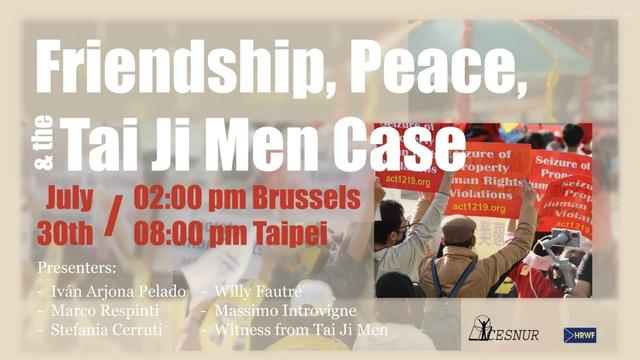On International Friendship Day 2022, scholars, human rights activists, and Tai Ji Men dizi discussed the power of friendship and the Tai Ji Men case.
by Daniela Bovolenta

On July 30, 2022, the United Nations observed the International Friendship Day. CESNUR, the Center for Studies on New Religions, and the Brussels-based NGO Human Rights Without Frontiers organized one of their bi-monthly webinars, on “Friendship, Peace, and the Tai Ji Men Case.”
Iván Arjona Pelado, president of the Spanish United Nations-ECOSOC-accredited NGO Fundación para la Mejora de la Vida, la Cultura y la Sociedad (Foundation for the Betterment of Life, Culture, and Society), introduced the webinar and the video “Japanese Media Bravely Expose Fraud, Crack Down on Corrupt Bureaucrats.” The video reflected on how in 2016 journalists exposed the sale of state-owned land at a price below market, a scandal involving prominent Japanese politicians. Arjona Pelado mentioned the promotion of the International Friendship Day by the United Nations as a way of connecting world citizens for the sake of peace and human rights. “This, Arjona Pelado said, is what Tai Ji Men is all about.”
Marco Respinti, director-in-charge of Bitter Winter, mentioned statistics according to which “friend” and “friendship” may well be the most uttered words in human history. He discussed the differences between friendship and romantic love, and the voluntary element intrinsic to friendship. He quoted 12th-century Catholic Cistercian monk Aelred of Rievaulx, who wrote about the spiritual roots of friendship.
Respinti found among Tai Ji Men dizi a deep and spiritually based friendship, which explains their wonderful resilience in the face of persecution. He noted how this friendship gives dizi the strength to confront injustice without violence or hate, which is also a basic teaching of Christianity and other religious tradition.
The full video of the webinar.
Stefania Cerruti, external relations manager of MEDIS, the Major Emergencies and Disasters International School, discussed how friendship shines during disasters, and may even change the course of political events. She used as an example something she discovered during a trip to Vilnius, Lithuania by visiting a monument. It was the heroic case of Mieczysław Dordzik, a Polish high school student who died during the catastrophic 1931 flood in Vilnius, while attempting to save the four-year-old child of a Jewish family he was befriending. The Catholic Polish boy attested with his life his friendship to a Jewish family in a time when anti-Semitism was widespread. His sacrifice was not vain, Cerruti explained, as the Catholic and Jewish communities came together to celebrate Dordzik, and the anti-Semitic tension was defused, which had long-lasting consequences.
Cerruti quoted teachings about friendship, conscience, and disasters by Dr. Hong Tao-Tze, the Shifu (Grand Master) of Tai Ji Men, who also teaches that friendship among world citizens of different cultures may be a powerful force for good. She expressed the hope that the friendship uniting dizi, scholars, and human rights activists may also solve the “tax disasters” caused by tax bureaucrats in Taiwan.

Willy Fautré, co-founder and director of Human Rights Without Frontiers, introduced the testimonies by five dizi and the video “A 26-Year Injustice: A Documentary Regarding How Bureaucracy Bullies Citizens.” The video revisited the Tai Ji Men case. It also presented the testimonies of Taiwanese experts who explained how what happened to Tai Ji Men is representative of systemic and unsolved problems in Taiwan’s bureaucracy. Fautré quoted yet another case of effective friendship, the one connecting his father, a simple tramway driver, with immigrant from different countries to Belgium he tried to help in difficult times. Fautré incited Tai Ji Men dizi to keep their wonderful friendship. It is essential to resist injustice, he said, and is also something from which international scholars are learning a lot.
Ruby Chang, a high school teacher, mentioned the story of her family of dizi and returned to a classic incident that has been mentioned in other events about the Tai Ji Men case. It is taken from “The Records of the Grand Historian,” a historical and literary masterpiece about ancient China completed around 94 BCE. In 207 BCE, a corrupt Chinese Prime Minister called Zhao Gao declared that a stag he presented to the Second Emperor of the Qin dynasty was indeed a horse, and had the courtiers who refused to call the stag a horse executed. For Zhao Gao, this was a brutal affirmation of his power.

In the Chinese tradition, however, subverting the meaning of words unleashes dark forces nobody can control, and ultimately Zhao Gao’s actions led to the fall of the Qin dynasty and his own ruin and death. Changing the words’ meaning and confusing right and wrong, Chang said, also happened in the Tai Ji Men case. The Zhao Gao story shows that the consequences of such wrongdoings may indeed be ruinous for entire nations, she concluded.
Octavia Kuo, a shipping specialist, told the moving story of how she cultivates friendship by sending blessing cards, some of them about the Movement of an Era of Conscience, a concept promoted by Dr. Hong, to all friends she made abroad when participating in Tai Ji Men’s world cultural and martial arts events. She also mentioned that while Taiwan spends billions in subsidizing cultural activities, Tai Ji Men has never received government subsidies and its events and international tours are self-funded by Shifu and dizi.
While acknowledging the outstanding work of Tai Ji Men dizi as ambassadors of Taiwanese culture throughout the world, Kuo said, authorities in Taiwan have never been able to stop the tax persecution of the movement. The support of international friends, Kuo concluded, may be the key to unlock the solution of the Tai Ji Men case.

Selina Liu, a self-media worker, discussed friendship and the longing for peace through the story of a Brussels woman she met in California on the day Belgium was hit by a terrorist attack. Peace cannot be promoted ignoring justice, Liu said. Prosecutor Hou Kuan-jen, who is at the origin of the Tai Ji Men case, perpetrated eight major violations of law, as recognized by Taiwan’s Control Yuan. However, he was never punished. On the contrary, he was promoted to deputy director of the Agency Against Corruption and this year to director of the Institute of Forensic Medicine. While these developments may justify pessimism, Liu said, strengthened by their friendship and the support of so many international friends, Tai Ji Men dizi trust that their fight for freedom and justice will one day succeed.
Huang Zi-Yan, an elementary school teacher, shared her experience of teaching about tax justice to Taiwan sixth-grade students. They understood the issue and asked why, while for a simple speeding ticket photographic evidence is needed, in so many tax cases taxpayers are presumed guilty unless they can prove their innocence. Children were also surprised to learn that for every ten households in Taiwan, on average nine households owe enforceable taxes and fees. These are basic issues of justice and democracy, Huang said, that even elementary school children can understand. It should not be that difficult for Taiwan’s top politicians, including President Tsai, to also understand the problems and solve the Tai Ji Men case and other cases of blatant tax injustice.
Emily Tsai, a university student, reported how she was a shy girl and had problems in making friends. She became a Tai Ji Men dizi at age 11, and by practicing qigong she overcame her shyness and learned how to start meaningful conversations even with complete strangers. Notwithstanding the acknowledged benefits Tai Ji Men offers to dizi and society at large, tax persecution has continued, Tsai said.
Tsai also returned to the question of the two United Nations main human rights covenants, the International Covenant on Civil and Political Rights (ICCPR) and the International Covenant on Economic, Social and Cultural Rights (ICESCR), which Taiwan incorporated into its domestic law in 2009. The non-solution of the Tai Ji Men case, Tsai said, demonstrates that the Two Covenants are not yet fully respected in Taiwan.
Massimo Introvigne, an Italian sociologist of religions who serves as managing director of CESNUR and editor-in-chief of Bitter Winter, offered the conclusions of the webinar. He mentioned some literary examples confirming what several speakers in the webinar said, that friendship can have far-reaching consequences and even change the course of history.
Introvigne quoted the friendship of Cloridano and Medoro in the 16th century epic poem by Ludovico Ariosto “The Frenzy of Orlando,” and between Euryalus and Nisus in Vergil’s “Aeneid,” a poem written a few decades before the birth of Jesus Christ about the foundation of the city of Rome. Although these stories of friends willing to sacrifice their lives for each other are fictional, Introvigne said, there are historical cases too, including the one mentioned by Stefania Cerruti. Ariosto and Vergil wrote epic poems, Introvigne concluded, but the story of Tai Ji Men and their 26-year fight against injustice is also epic, and is based on friendship.

The webinar concluded with a video featuring the tenth episode of “Unbreakable Bonds,” a very detailed presentation of the Tai Ji Men case that the webinars present in installments.
Source: Bitter Winter

